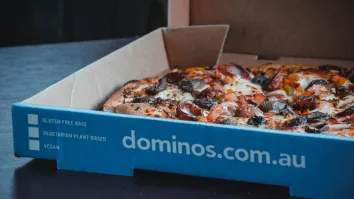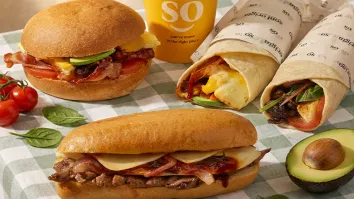
‘A game changer’: how the drive-thru is fueling Guzman y Gomez’s path to be a global fast food brand
Founder Steven Marks offers his thoughts on reaping success in the channel, latest updates on their U.S. expansion, and why he’s saying no to in-store kiosks.
Guzman y Gomez (GYG) has made no secret of its appetite for drive-thru stores, having made them a major part of their growth strategy since opening their first one in Nerang in 2015.
Looking back, its founder said the move was a “game changer”, and further informed his idea of what fast food could be.
“It was kind of the lightbulb moment for me,” Steven Marks told QSR Media in an interview. “We're just as fast as traditional fast food but the major difference is our food quality...Who said fast food had to be bad food?”
Six years later, Marks says their “world class” approach to the channel is just getting better.
“Everybody wants to have a drive-thru these days,” he said.
Of the chain’s 140-plus domestic stores (and counting), close to 50 feature drive-thrus with double lanes. Almost all of the 35 restaurants they are opening over the next 12 months will also be drive-thru stores - part of a larger plan for the brand to about 600 restaurants, which will make it part of the top ten largest restaurant brands in the country.
“Every year that GYG continues to grow, that number keeps going up,” Marks said “We're comping 30 to 40% year over year, which is unheard of.”
The numbers offer a clear explanation: average turnover for these stores are now closer to $90,000 in a week, with some even reaching $150,000.
Being built for drive-thru
GYG’s kitchens, Marks explains, were built for drive-thru from the ground up, saying that they have been employing a double linear system, offering a separate line for orders made through drive-thru, third-party delivery platforms and their app to prevent clogging with those in-store.
“You can't just put a hole in the wall and [have] a car drive up and say you're a drive thru,” he said. “Other restaurant chains...[are] trying to add another line. All these guys are trying to retrofit their kitchen to fit into a drive-thru - [it] doesn't work that way.”
Marks also cited technology placed in their drive-thru lane that measures service times, including the duration when a car comes in and customers are able to order in their menu boxes.
Orders, on average, are finished around three and a half minutes. The goal, the executive said, is to bring the experience time even further to less than three.
This includes even assessing the orders that take longer than others and crafting them accordingly. But don’t expect GYG to compromise on how items are made, Marks said.
“I will never, ever, ever compromise on quality just purely for speed. So we have to figure out speed because the quality is never going down.”
Transactions also grew, Marks said, because of GYG being able to give customers value with quality.
“People are more educated than ever about food. What happened with traditional fast food [chains] was they were allowed to lower the standard of their food and take advantage of the people that were time-poor...and to me that's wrong,” he said. “But if you give them value with high quality food, they'll come back."
Marks also sees the increased demand for delivery staying and their breakfast line starting to pick up in more restaurants, also referring to it as another game changer for the brand.
He also credited an eight-man team solely dedicated to finding “Triple-A” sites for these stores, and another team of “data people” offering insights for the business, including the type of materials used to build their sites.
“I want the busiest corners and the busiest intersections, because I want the most people to come and experience GYG. You would think that that would be a strategy for fast food brands but those sites cost more. You have to be extremely confident of your brand and the ability to have revenue.”
Taking on Taco Bell, Chipotle in the U.S.
GYG is also banking on drive-thru to disrupt the Mexican fast food scene in the U.S. and compete with Taco Bell and Chipotle — billed in past years as a homecoming of sorts for Marks, a New York native and once a trader for Wall Street hedge fund manager Steven Cohen.
The target: up to 150 restaurants within a two to three-year time frame, differentiating by offering across all traditional dayparts. Marks expects the brand to have about three to four outlets in Illinois, where GYG debuted.
“Nobody's doing breakfast, lunch, dinner in drive-thrus,” Marks said, adding that the company’s in the process of putting together a team to give them “great credibility” to grow in the American market.
Building foundations, high-performance culture
Investing ahead of expected growth was key, Marks said.
“I'm the biggest advocate of making sure that your foundations are built way ahead of where your revenue growth is gonna be. I see the people that are successful do this very well,” he said. “We all believe that to meet demand and to exceed demand, you need to make sure you get the people here that support restaurants and GYG has done a great job with that.”
Looking to hire about 2,000 people for GYG’s growing network, Marks is confident his determination to expand will trickle down to its restaurant teams at attract more talent, citing mobility in career development within the business.
A culinary operations coach (corporate area manager), Marks said, is now their U.S. head of operations.
“We're fanatics about food, we're also fanatics about technology, the environment [and] sustainability. We have charities in Mexico, we support artists - this company means something,” he said.
“That's why we're able to attract such amazing talent and for me, the crazy guy at the top, there's a lot of soul in this business. I always believe that you can build a very, very successful business and you can still be very competitive but very ethical. It's a very high performing culture.”
Marks’ approach to talent also translates to the chain’s in-store experience, ruling out in-store kiosks and staying with person-to-person engagement.
“It’s meaningful and genuine. If I look at everything besides the food, one thing I'm most proud of is our people.”
IPO still on the menu, saying no to a second brand
Marks also confirmed that an IPO is still part of the plan, but said they do not have a set timeline at this stage. The listing was put on hold after Hamish Douglass’ Magellan Financial Group outlaid $86.8 million for a 10% stake in December, valuing the business at almost $870 million. (Magellan subsequently revealed in January it has settled the acquisition, paying $95.4 million for an 11% interest.)
“[Douglass] and his team have been an incredible addition. And besides the credibility that Magellan brings, his knowledge [and] network in the US has been phenomenal. So we're super excited about that,” he said.
Marks also turned down the idea of growing another brand.
“People ask us all the time, ‘You have this infrastructure built, you want to run another brand?’ Nope, just GYG,” he said.
“We all believe that GYG will be the best restaurant company in the world one day, and the only way you can be the best is to be solely focused on one thing and make sure you do better than anyone else.”
























